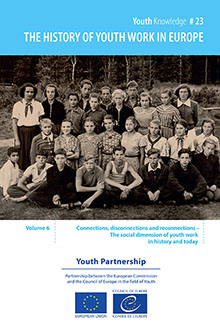The history of youth work volume 6

Howard Williamson, Tanya Basarab and Filip Coussée (eds.)
Council of Europe, 2018. 978-92-871-8513-6
This sixth publication in the History of Youth Work in Europe project based on the workshop held in Malta – Connections, Disconnections and Reconnections: The Social Dimension of Youth Work, in History and Today – looks at the relationship between youth work and social work and the role youth work can play in the social inclusion of young people.
Contributors have reflected on concepts, tools and support measures for more vulnerable and often socially excluded young people and have sought to promote a common understanding of youth work as a social practice.
The workshop that led to this book sought to understand where youth work has positioned itself from its origins, through its development, to its contemporary identity. Is youth work as much a social practice as a non-formal educational one? Where does the balance between these two dimensions lie? What are the mutually enriching dimensions of these two fields in terms of their impact on young people’s lives?
While most agree that youth work needs to be further defined as a practice or profession in itself and that the process of shaping its identity continues in different ways in different countries, it is clear that when it comes to a cross-sectoral perspective and youth work’s interaction with social work,
the picture becomes significantly more complex, arguably much richer and certainly more dynamic than might have hitherto been foreseen.
Download The History of youth work in Europe - Volume 6 >>

Edited by Griet Verschelden, Filip Coussée, Tineke Van de Walle and Howard Williamson.
Council of Europe, 2009 978-92-871-6608-1
Youth work is a polyvalent and multi-faceted practice. It takes place in a wide range of settings, varies from unstructured activities to fairly structured programmes, reaches a diverse array of young people, touches upon many different themes and cuts across several other disciplines and practices. This versatility is one of the strengths of youth work, but at the same time it may lead to fragmentation and product vagueness.
In this book we take a historical perspective that aims to identify the close links between youth work developments and broader social, cultural and political developments. What are the beliefs and concepts that underpin youth work? How do they relate to the recurrent youth work paradox, that youth work produces active and democratic citizens but at the same time seems ineffective for young people who are excluded from active citizenship? Tracing back the roots of youth work and identifying different evolutions within and between countries help to initiate a fundamental discussion on modern-day youth work identity and to cope in a constructive way with the recurrent paradoxes of youth work.
The different authors highlight the youth work policies in Belgium (Flanders), Germany, England, Poland, Malta, France and Finland.
Download The history of youth work in Europe and its relevance for youth policy today >>
The history of youth work in Europe and its relevance for youth policy today is also available in Bulgarian
